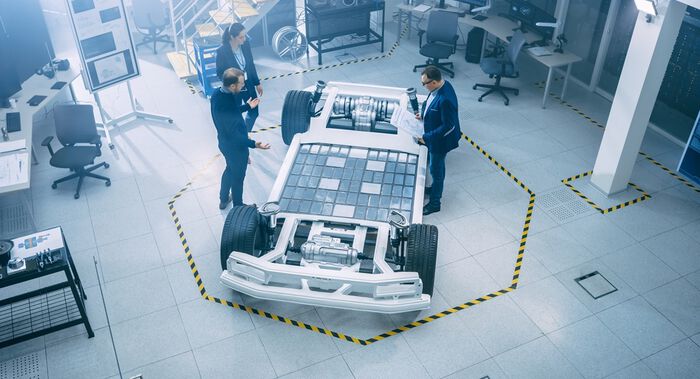TOPICS & NEWS
Articles and interviews on current trends, technology and industry challenges, information on our consulting services, seminars and events as well as company topics:
Here you can find out what drives EFESO.
Articles and interviews on current trends, technology and industry challenges, information on our consulting services, seminars and events as well as company topics:
Here you can find out what drives EFESO.
Experte: Fernando Cruzado | 04/25/2024 | Teilen auf in

Sustainability in the mobility sector is often associated with the reduction of CO2 emissions through electric vehicles. However, the environmental impact of a car must be minimized over its entire life cycle. The circular economy plays a central role here, and the European industry is realigning its value chains towards this. This requires companies to be prepared to open their operational areas to the development of cross-industry cooperation.
The framework conditions for the industry's sustainability course have been formulated by legislators in the EU. The digital product passport should be mentioned here in particular: this is expected to be mandatory for market access from 2027, initially for vehicle batteries. In addition, the EU “End-of-Life Vehicles Directive” (ELV) aims to promote the recovery of materials from vehicles and thus reduce their environmental impact at the end of their product life cycle.
This commitment to sustainability is not only changing the automotive sector. All industries with a high demand for raw materials, that cannot be met in the EU or do not correspond to environmentally friendly value creation, must rethink their approach. Regarding the EU countries, the chemical industry in particular is playing an important role alongside the automotive industry in driving forward more sustainable production and efficient material recycling. This is because it provides the technologies and processes with which recyclable materials can be reprocessed to meet the requirements of the automotive sector – for example in terms of weight, temperature resistance or formability.
In fact, many companies are already turning their attention from the challenges to the opportunities that recycling, the circular economy and other areas of industrial sustainability hold in store for them. Circular business models are becoming a key value-adding factor: when implemented in practice, companies benefit from lower energy and material costs while also helping to reduce waste and carbon emissions in the industry. 84 percent of leading companies in the European chemical industry are already developing a circular business model or are planning to introduce one in the next two to five years (1). This shows that there is hardly any way around cooperation to realize this in the short time available. In the case of partnerships between the automotive and chemical industries, these fields of action are particularly critical to success:
- Solving technological challenges / economies of scale
- Reducing costs and promoting innovation / example of Catena-X
Solving technological challenges
Cost-covering remanufacturing of vehicle components requires suitable technologies. A well-developed, heterogeneous market of solution providers in the recycling / circular economy in Europe gives European companies a locational advantage over competitors in Asia or the USA, which are still lagging behind in terms of method and technology development. With the existing engineering capacities, technology leadership is rising in the circular economy in Europe: however, the already existing, highly developed individual solutions, for example for pollutant removal and material separation, must also be able to meet industrial requirements.
Reducing the manufacturing costs of individual goods while increasing the number of units produced, is therefore also becoming a central task for the industrial circular economy. This requires the construction of facilities that meet the economies of scale, i.e. the dependency of input and output in production. In addition to the facilities, other production factors such as capacities and materials must be designed in such a way that the value of the manufactured products exceeds the required input, i.e. the cost advantages of mass production are achieved. The way to attain this is through partnerships. For example, if a company has a unique recycling technology, there’s the opportunity to invest in CapEx with partners – and therefore jointly build and economically operate suitable, large plants.
Reducing costs and promoting innovation
The potential of cross-industry partnerships is illustrated by the example of "Catena-X": this collaboration platform for the automotive industry also involves market leaders from the chemical industry in the area of circular economy (2). The platform enables its parties to interconnect processes and data streams along their value chains – this has already worked perfectly in the development of the product passport for e-vehicle batteries, for example. In addition to the standard itself, it was defined who has to provide what information at what time and in what quality in the data chain, so that every manufactured vehicle can receive a battery passport in future. Furthermore, the standardized and modular architecture of the platform shortens time-to-market cycles and reduces implementation costs for software solutions.
This proves to be an ideal model for the challenges of the circular economy, which moves across value chains. Another positive effect of this form of cooperation is the high level of trust, that raises between the partners sometimes – especially in the case of high joint investments in new systems and machines, the partners ultimately commit to each other in the long term. However, this also requires a willingness to share knowledge about innovations and cost structures.
Realizing innovation
As a technological infrastructure, collaboration platforms such as Catena-X significantly simplify the integration of the circular economy and industrial sustainability. However, jointly developing a new, ambitious business model as a concept and implementing it in reality addresses various challenges. To do this, companies should use the interfaces and "levers" in their operations areas, for example:
- Accelerate development and engineering processes and avoid overengineering in plant / mechanical engineering: What enables the company to position capacity as a pioneer in the market?
- Thinking through supply chain processes: How can long-term, reliable planning be achieved? Especially when several partners from your own and / or other industries are involved?
- Operating supply chain ecosystems effectively and efficiently: What is needed to optimize processes from purchasing and sampling to quality assurance and plant operation? How can digitalization and value creation potential be activated at the same time?
It is worth considering the circular economy as a window of opportunity for European industry. There is still a head start in the global market, but political measures for stronger regulation in the circular economy are already gaining importance in the USA, China and Japan. The close combination of automotive and chemical expertise in the context of Catena-X and other collaborations is an example of the direction in which things should proceed.
Sources
(1) EFESO, Ovinto and WBR Insights: Sustainability through collaboration report, 2024
(3) See https://catena-x.net
Learn more
EFESO services: Industry expertise
EFESO project examples from the chemical sector and other industries: Case studies
|
|
Thank you for Signing Up |


This website uses cookies. Those have two functions: On the one hand they are providing basic functionality for this website. On the other hand they allow us to improve our content for you by saving and analyzing anonymized user data. You can redraw your consent to using these cookies at any time. Find more information regarding cookies on our Data Protection Declaration and regarding us on the Imprint.
Click here for Cookie Settings.

